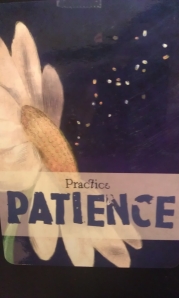An entire wall of mirrors, another wall of windows, and a class full of thin, trim, and apparently very flexible 20 somethings has led to a much-needed practice of self-compassion this evening. As I stared at myself while navigating this part Pilates and part Yoga (PiYo) class, I almost laughed at how ridiculous I looked. Of course, I quickly wavered between laughter and outright frustration as I tried to figure out how to go from a ‘low lunge’ to a ‘downward dog’ without falling over. Oh yes, the entire hour was full of self-talk ranging from “what the hell is she doing?” to “oh no, I think I just pulled a muscle” and “holy cow, is that a trick mirror?” Those thoughts were tough enough, but then it only got worse when I started comparing my moves to the women around me or, gulp, the pencil thin instructor.
It was apparent that my inner critic was way too loud tonight. All of those negative thoughts and ideas kept me from focusing on the fact that I finished the class without falling and that I got a great workout. Not to mention that I totally tried something brand new today. On days like this when I get caught up in what my body looks like, how people may or may not perceive me, and compare my own success to what others are doing around me, I have to be very deliberate and practice self-compassion.
The first step is acknowledging that I’m being incredibly critical of myself. Next thing is to take a moment and identify the good things about the experience. Third step is to remember why I took the class to start with, and then re-frame everything in my head like I was talking to a close friend (because I would never be so harsh to a friend). The final step is to take all that revised information and let it sit in my heart for a few minutes while taking in some deep breaths.
Self-compassion is not always easy, but I do believe it is always necessary. I think the more we practice compassion for ourselves the easier it becomes to feel compassion for others. And then, the more we experience compassion for others, the easier it becomes to experience for our own self. And when we are more compassionate, the more likely we are to engage in meaningful and productive experiences instead of isolating ourselves and feeling disconnected. So whenever I catch my inner critic chatting away too loudly, I will simply remind myself to take a deep breath, practice some self-compassion, and enjoy the experience for what it’s worth instead of withdrawing and robbing myself of a potentially awesome interaction. So bring on the PiYo classes and bring on the new and exciting adventures. With a little dose of self-compassion, I believe we can do anything we set our hearts to.




You must be logged in to post a comment.